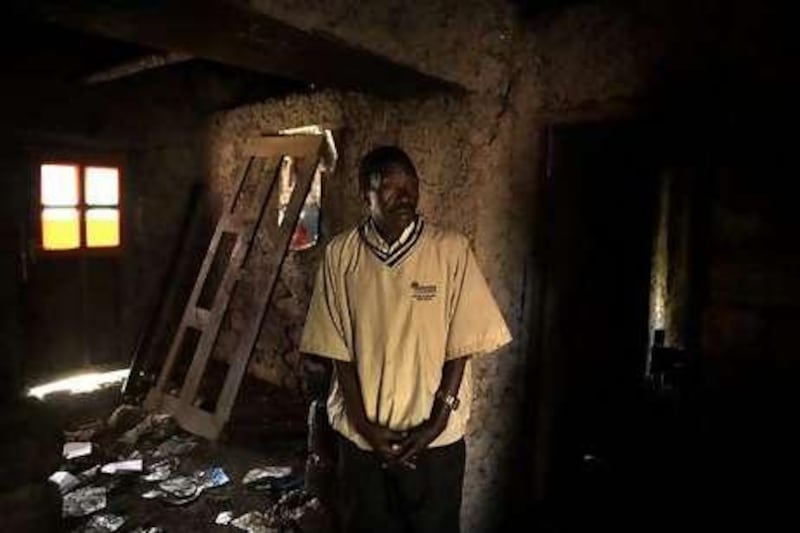BUHUMBA, DR CONGO // First came the gun shots echoing off the verdant hills to the east. Then came the flood of villagers and government soldiers fleeing as the powerful rebel force advanced like a tsunami on this small town of mud-brick homes. As the sound of gunfire drew nearer, Joseph Akwamungu, an administrator with the local government, decided to join the throng running for safety. He packed up a small bag of clothes and a few books, gathered his eight children and locked the door to his house, hoping that all his worldly possessions would still be there when he returned. "We were in a hurry because of the fighting," Mr Akwamungu, 62, said. "We didn't have time to pack things. We didn't think we would be gone long." Mr Akwamungu and the other villagers fled to Goma, the provincial capital. It was late October, the start of a rebel advance in eastern Democratic Republic of Congo. The rebels seized numerous villages and pushed the frontlines of the conflict to the outskirts of Goma before declaring a ceasefire. After two weeks away, Mr Akwamungu returned to the village still under the control of rebels loyal to a Tutsi commander. He found his house completely gutted, all his possessions gone. "When I arrived, I saw the door was open. The locks were broken," he said. "It was empty. I didn't say anything. For a man, it is not easy to cry. I just sat down to think. I was astonished." Rebels had carried off his kitchen supplies, tables, chairs, mattresses, books, 15 bags of maize, 12 goats, even his children's clothes. They left two overturned bed frames, a broken hurricane lantern and a few empty bottles of whisky. Papers lay strewn about on the dirt floor of the house. For the past three months, the rebels, led by Laurent Nkunda, a renegade Tutsi general, have ramped up their war against government forces, the latest chapter in DR Congo's 10-year civil war. Caught in between are the civilians. All parties in this war have looted, raped and killed civilians on a large scale, human rights monitors said. More than five million have died during the conflict and millions have been displaced, including 250,000 within the past three months. A UN peacekeeping mission in Congo, known as MONUC, has failed to stop the widespread atrocities against civilians, according to aid organisations. MONUC has 17,000 troops spread out across the entire country. "UN peacekeepers need to do more to protect civilians, who desperately need their help," said Anneke Van Woudenberg, senior researcher in the Africa division of Human Rights Watch. "More troops and resources are urgently needed to shore up the blue helmets." In early November, Mr Nkunda's National Congress for the Defence of the People (CNDP) rebels killed 150 people in the town of Kiwanja north of Goma, according to a Human Rights Watch report released this week. Government forces have also been accused of looting and killing civilians. The government has struggled to quash Mr Nkunda's rebellion. The rebel leader says he is fighting to protect his ethnic Tutsi people from Hutu militias that are backed by the Congolese government. Analysts say the war is also about access to political power and eastern Congo's vast mineral wealth. The national army "continues to be responsible for grave human rights violations, including frequent rape and looting", according to a recent report by Amnesty International, the human rights group. Both the rebels and government forces deny targeting civilians. "We are here for the population. We cannot make trouble for them," said Richard Tiama, a commander in the national army. But witness accounts tell a different story. As the CNDP rebels surrounded Goma and threatened to take the strategic town in late October, government forces fled the town, killing and looting along the way. Odile Kibanja, 26, locked herself in her room with her two children when a group of government soldiers stormed into the compound where she lives with several neighbours. The soldiers banged on doors demanding money and mobile phones. When her neighbour refused to open the door, the soldiers shot through the lock and entered the room. They opened fire killing one 17-year-old boy and wounding another. The soldiers next moved to Ms Kibanja's apartment and she opened the door. She was forced to sit in a line against the wall with her children, her brother and a doctor who lived next door. Again the soldiers demanded money. When they said they did not have any, the soldiers shot and killed the doctor. Bloodstains and bullet holes mar the wood-panelled wall of the small, dimly lit room. Finally, the soldiers left taking whatever possessions they could carry. On their way out, they shot Ms Kibanja's 14-year-old brother in the arm. "When I see any government soldiers, I feel angry," Ms Kibanja said. "They killed instead of protecting us. Even the CNDP [rebels] can come and kill. They are the same. What we need is to live in peace." mbrown@thenational.ae
Civilians caught in Congo crossfire
Government guilty of grave human rights, says Amnesty, as country is riven by rebels and soldiers battling for control and wealth.

Editor's picks
More from the national




